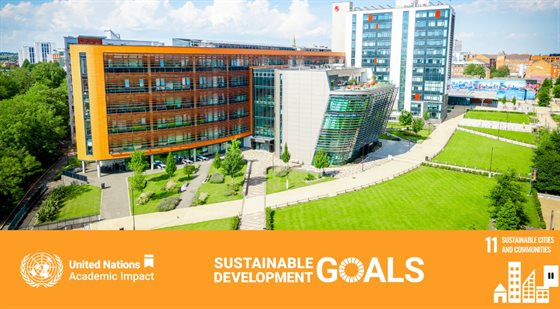The United Nations has chosen De Montfort University Leicester (DMU) to lead a network aiming to build better cities and communities across the world.
The university has been made chair of the global Academic Impact hub for Sustainable Development Goal (SDG) 11 – sustainable cities and communities.

This means it will lead a team of other co-chair universities across the globe in helping to address issues like affordable housing, air pollution, clean water and sanitation, and renewable energy in cities worldwide.
The university is the only one in the UK to be asked to become a Hub Chair by the United Nations Academic Impact (UNAI) initiative.
Professor Katie Normington, Vice-Chancellor of DMU, said it was an honour to be chosen.
She said: “We have built a strong relationship with the UN over many years at DMU and have, in that time, embraced the goals and targets of the SDGs thoroughly, embedding them into not only the way we run the university, but in every aspect of the teaching we give our students and our research.
“SDG 11 is at the heart of what a university should be doing – enriching its community. We have an abundance of experience working with many partners in Leicester to help improve the city and it will be an honour to share and build on this work over the next few years.”
In being selected to lead SDG 11 work, DMU becomes the only UK university to be asked to chair a Hub, which it will do over a three-year term. Worldwide, the UN received 330 applications from universities hoping to be chosen as Hub chairs.
DMU will lead the UNAI SDG 11 Hub over a three-year term, from January 2025 to December 2027as part of the larger UNAI network, which comprises over 1,700 universities and colleges across more than 150 countries.
Maher Nasser, director of the UN’s outreach division, said in a letter confirming DMU’s appointment: “DMU was selected based on its wide range of outreach programmes that have effectively promoted social cohesion
“Notably, the amplification of local voices through Project Atefa (a refugee advocacy project led by student volunteers to tell the stories of refugees and asylum seekers) and the outreach efforts aimed at young people during COP 29 stand out as significant achievements.”
The UN created 17 Sustainable Development Goals in 2015, in order to tackle many of the biggest issues our world faces. Each goal is made up of a number of specific targets, with a total of 169 targets covering problems like equality, poverty, food, health and wellbeing and renewable energy. The timeframe to achieve the targets is 2030.
In 2018, DMU was chosen by UNAI to be a global hub for SDG 16, peace, justice and strong institutions. This accolade was in recognition of its efforts to build a global network of universities and other organisations to share ideas and initiatives to meet the SDGs, initially around the rights of refugees and migrants.
In the years since, DMU’s SDG 16 work evolved to include projects which have sought to tackle modern slavery, democracy deficits, local economic regeneration, and organised crime, leading to a renewal of the hub status in 2021.
Dr Mark Charlton, associate director for sustainable development at DMU, said that the move to chair SDG 11 was an exciting new opportunity.
He said: “So much of what DMU does already fits with SDG 11. The way we have built understanding of the SDGs into our teaching means our graduates leave the university with a headful of ways to help make the industries they go into more sustainable.
“Our research culture is built on making real and positive impact in our cities and communities.
“And we have strong partnerships across the city, giving our staff and students many chances to get involved and have real influence in the way their community develops.
“This is a real opportunity to make a difference on a global scale.”
Posted on Friday 24 January 2025